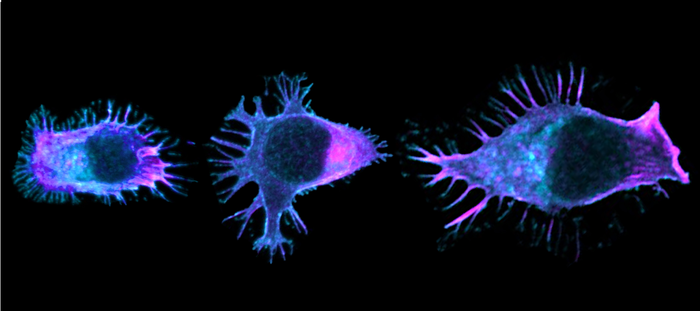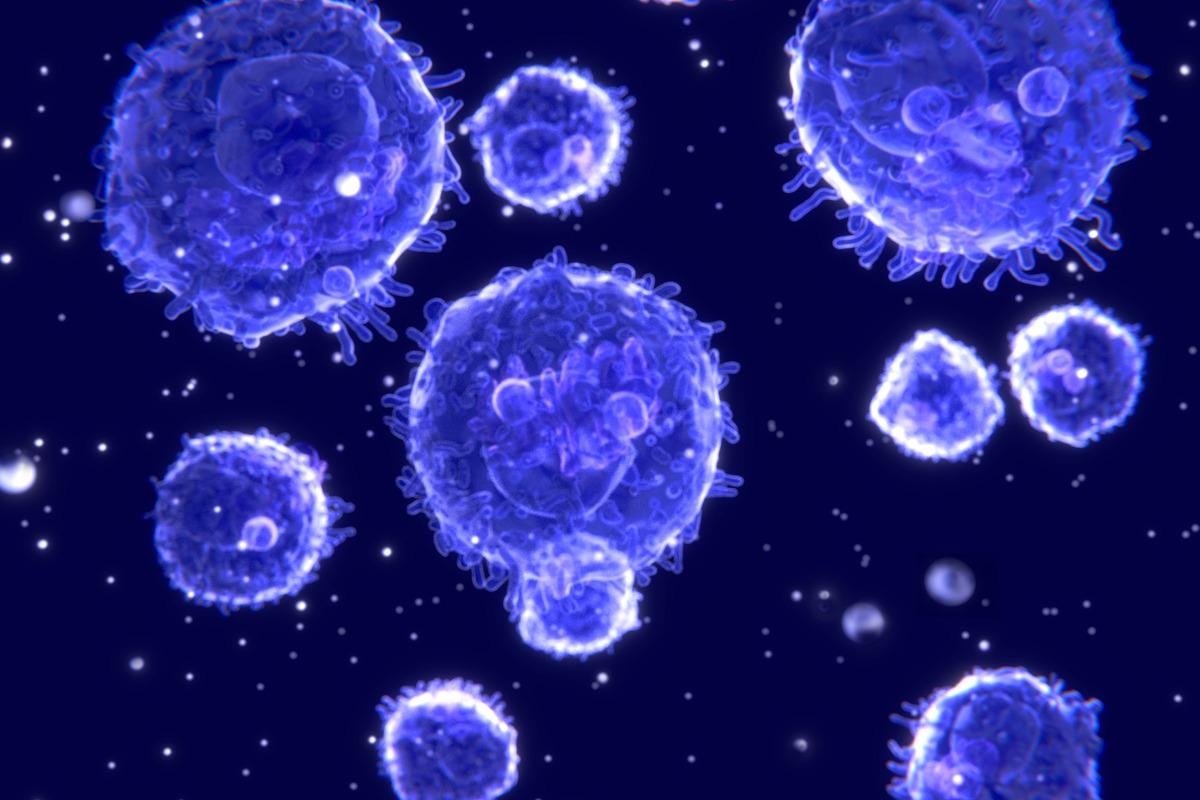Mutations in the APC gene cause the production of intestinal polyps in persons suffering from familial adenomatous polyposis, a genetic disease that predisposes them to colon cancer. Mutations also impair immune system activation. Scientists from the Institut Pasteur, INSERM, and Université Paris Cité detail the processes that alter T lymphocyte shape and prevent them from migrating towards tumors to be eliminated in a new study.
 Migrating human T lymphocytes revealing a broad protrusion at the leading edge and long adhesive protrusions at the rear. Image obtained by confocal fluorescence microscopy: filamentous actin, pink; VLA4 adhesion protein, blue. Image Credit: Institut Pasteur/Lymphocyte Cell Biology. Image by Marta Mastrogiovanni.
Migrating human T lymphocytes revealing a broad protrusion at the leading edge and long adhesive protrusions at the rear. Image obtained by confocal fluorescence microscopy: filamentous actin, pink; VLA4 adhesion protein, blue. Image Credit: Institut Pasteur/Lymphocyte Cell Biology. Image by Marta Mastrogiovanni.
This study was published on April 13th, 2022, in the journal Science Advances. It sheds new light on immune cell migration, a crucial component in the antitumor immune response.
Familial adenomatous polyposis is a disease that is passed down from generation to generation. Mutations in the tumor suppressor gene APC (adenomatous polyposis coli) are to cause. If the polyps are not surgically removed, those who inherit these genes acquire hundreds, if not thousands, of polyps in their colon starting in adolescence and eventually colorectal cancer in adulthood.
As it’s a hereditary disease, all of the body’s cells carry the mutation and can be affected in different ways. Today we know that these mutations disrupt the functioning of colon cells but also cells of the immune system.”
Andrés Alcover, Study Joint Senior Author and Head, Lymphocyte Cell Biology Unit, Institut Pasteur
The group of scientists from the Institut Pasteur, CNRS, and Inserm—sponsored by the French Cancer League since 2018—has already shown the dual impact of APC mutations in prior investigations.

Image Credit: Juan Gaertner/Shutterstock.com
These alterations not only inhibit intestinal epithelial cells from properly developing and forming tissue growths (polyps), but they also impair immune cell function, preventing them from efficiently attacking polyps and tumors. Two systems that work together to enhance tumor development.
To better understand what stops immune cells from performing their function, researchers opted to focus their attention on T lymphocytes, which have the job of infiltrating tumors and detecting and destroying them.
Dr Hélène Laude and Dr Marie-Nolle Ungeheuer, biologists and clinical research physicians at the Institut Pasteur’s ICAReB platform, addressed the patient association POLYPOSES FAMILIALES France for this purpose. The association selected patient volunteers for the extraction of blood samples as part of a new clinical research initiative.
Andrés Alcover stated, “Thanks to the association, we met patients and also clinicians specialized in polyposis. We learned a lot about this complex pathological condition, the experience of patients and families, and the different levels of disease severity. We recognize the valuable role of the patients, who were highly motivated to take part in the study, and the input of specialists.”
The naturally mutant T lymphocytes found in these patients’ blood were grown and put through a series of in vitro tests. The researchers compared the behavior of diseased lymphocytes to that of lymphocytes from healthy patients using a variety of microdevices such as filters, channels, protein substrates, and the layer of vascular endothelial cells.
Scientists looked at how lymphocytes traveled through biological surfaces that resembled blood vessel walls, as well as how readily they could split cells and penetrate tight cell layers.
In order to move along blood vessel walls, cross them and reach the tumor to be infiltrated, healthy lymphocytes change their morphology. Something akin to a large adhesive foot, supported by the lymphocyte’s cytoskeleton, grows longer in the direction of migration. This polarization is essential for movement in the right direction.”
Marta Mastrogiovanni, Study Lead Author and Researcher, Lymphocyte Cell Biology Unit, Institut Pasteur
Mastrogiovanni pointed out, “In mutated lymphocytes, the microtubules making up the cytoskeleton are disorganized and there are fewer adhesion proteins. The cells lose their polarity and their ‘muscles’.”
Although mutant T lymphocytes do not always move slower than healthy lymphocytes, they cling to the walls less strongly and have a harder time traveling in a certain direction and passing through them. In a conclusion, this study revealed that their relocation was ineffective.
This discovery is important because the motility of immune cells is a key process in antitumor immune defense. We know that the immune system is very important in combating pathogens but we sometimes forget that it also contributes to combating cancer cells.”
Vincenzo Di Bartolo, Study Joint Senior Author and Researcher, Lymphocyte Cell Biology Unit, Institut Pasteur
Source:
Journal reference:
Mastrogiovanni, M., et al. (2022) The tumor suppressor adenomatous polyposis coli regulates T lymphocyte migration. Science Advances. doi.org/10.1126/sciadv.abl5942.